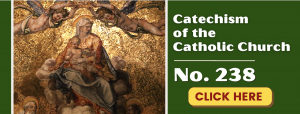Memorial of Saints Timothy and Titus, bishops

“For greater things you were born.” (Ven. Mother Luisita)
TUESDAY, January 26th Mk. 3: 31-35 Jesus said: “Who are my mother and my brothers?” And looking around at those seated in the circle he said, “Here are my mother and my brothers. For whoever does the will of God is my brother and sister and mother.”
- We are Jesus’ brother and sister and mother whenever we conform our will to the Will of God! Here are three inspiring articles. Which one speaks most to you?
Uniformity with God’s Will (Excerpt)… by Saint Alphonsus Marie de Liguori (+1787)
Uniformity in all Things. The essence of perfection is to embrace the will of God in all things, prosperous or adverse. In prosperity, even sinners find it easy to unite themselves to the Divine Will; but it takes saints to unite themselves to God’s will when things go wrong and are painful to self-love.
Our conduct in such instances is the measure of our love of God. St. John of Avila used to say: “One ‘Blessed be God’ in times of adversity, is worth more than a thousand acts of gratitude in times of prosperity.”
Furthermore, we must unite ourselves to God’s will not only in things that come to us directly from His hands, such as sickness, desolation, poverty, death of relatives, but likewise in those we suffer from man — for example, contempt, injustice, loss of reputation, loss of temporal goods and all kinds of persecution. On these occasions we must remember that while God does not will the sin, He does will our humiliation, our poverty, or our mortification, as the case may be.
We must not consider afflictions that come upon us as happening by chance or solely from the malice of men; we should be convinced that what happens, happens by the will of God for our greater good.
Cesarius points up what we have been saying by offering this incident in the life of a certain monk: Externally his religious observance was the same as that of the other monks, but he had attained such sanctity that the mere touch of his garments healed the sick. Marveling at these deeds, since his life was no more exemplary than the lives of the other monks, the superior asked him one day what was the cause of these miracles.
He replied that he too was mystified and was at a loss how to account for such happenings.
“What devotions do you practice?” asked the abbot. He answered that there was little or nothing special that he did beyond making a great deal of willing only what God willed, and that God had given him the grace of abandoning his will totally to the will of God.
“Prosperity does not lift me up, nor adversity cast me down,” added the monk. “I direct all my prayers to the end that God’s will may be done fully in me and by me.”… “That raid that our enemies made against the monastery the other day, in which our stores were plundered, our granaries put to the torch and our cattle driven off — did not this misfortune cause you any resentment?” queried the abbot.
“No, Father,” came the reply. “On the contrary, I returned thanks to God — as is my custom in such circumstances — fully persuaded that God does all things, or permits all that happens, for His glory and for our greater good; thus I am always at peace, no matter what happens.” Seeing such uniformity with the will of God, the abbot no longer wondered why the monk worked so many miracles.
Holy Obedience… by Father John Tauler, O.P.
The least little work done in holy obedience is nobler in God’s eyes and more worthy of reward than many great works performed by one’s own will. I declare to you in all truth that no lovelier offering can be made to the Almighty God than a truly humble and obedient heart. In a single instant a man can, by means of obedience and giving up of his own will to God, be made so humble that he will be led directly to God – more directly than if he spent ten years in practicing high devotions.
Obedience is that very noble virtue which is more pleasing to God than any of the others, even when we obey in matters which are in themselves of little moment. The eternal Son of God was, for our sake, made obedient to His heavenly Father – in His coming down from the Godhead to our poor human nature, in the embracing of His holy cross, and finally in His cruel and bitter death. Therefore, we must one and all be obedient to God in all divine things and human things, interiorly and exteriorly, without murmuring or contradiction – if God is to do His work of love unhindered and continuously within our souls.
Living Holy Obedience in daily life… by Venerable Madeleine Delbrel (+1964)
We, the ordinary people of the streets, know very well that as long as our own will is alive, we will not be able to love Christ definitively. We know that only obedience can root us in His death. We would envy our Religious Brothers and Sisters if we too could not “die to ourselves” a little more each day.
However, for us the tiny circumstances of life are faithful “superiors.” They do not leave us alone for a moment; and the “yeses” we have to say to them follow continuously, one after the other. When we surrender to them without resistance, we find ourselves wonderfully liberated from ourselves. We float in Providence like a cork on the ocean waters.
From the moment we wake up these circumstances take hold of us. It is the telephone that rings; it is the key that won’t work, the bus that doesn’t arrive or arrives full, or doesn’t wait for us. It is the person sitting next to us who takes up the whole seat; or the vibration of the loose window pane that drives us crazy.
It’s the daily routine, one chore that leads to another, some job we wouldn’t have chosen. It’s the weather and its changes – which is exquisite precisely because it is completely untainted by human doing. It’s being cold, or being hot; it’s the headache or the toothache. It’s the people we meet and the conversations they choose to start. It’s the rude man who nearly knocks us off the sidewalk. It’s the people who need to kill some time, and so they corner us. When we live with others, obedience also means we set aside our own tastes and leave things in the place others have put them.
In this way, life becomes an epic film in slow motion. It does not make our head spin. It does not take our breath away. Little by little, thread by thread, it eats away at the old man’s frame, which cannot be mended and must be made new from the ground up. When we thus become accustomed to giving up our will to so many tiny things, we will no longer find it hard, when the occasion presents itself, to do the will of our boss, our husband, or our parents. And our hope is that death, too, will be easy.
Copyright 2021 Oblates of the Virgin Mary
St. Peter Chanel Church, Hawaiian Gardens, CA

